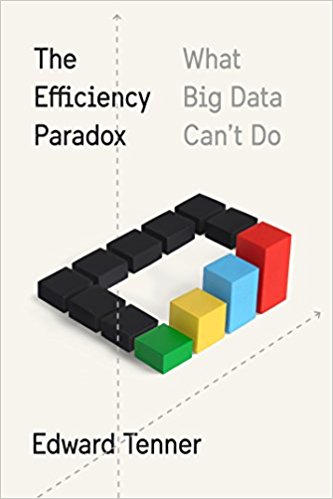You have /5 articles left.
Sign up for a free account or log in.
 The Efficiency Paradox: What Big Data Can't Do by Edward Tenner
The Efficiency Paradox: What Big Data Can't Do by Edward Tenner
Published in April of 2018.
I read lots of nonfiction. Unless these books are about higher education, higher education is unlikely to be mentioned. The Efficiency Paradox is different. Higher education plays a starring role.
This is one of the first books written by someone who works primarily outside of academia that gets at a fundamental truth about higher education right. That fundamental truth is that technology to advance learning can be great, as long as that technology is a complement - and not a substitute - for a well-trained and fully-supported educator.
In short, nothing matters more than the professor.
Any effort to make student learning more efficient by using technology to diminish the role of the professor will result in an inferior sort of education.
The fact that Tenner is not a full-time academic helps to make this observation both credible and insightful. Tenner does have a PhD in European History, but he has spent his career as an independent scholar and editor.
It is good to hear someone from outside of academia celebrate the labor-intense nature of education. So much of what we hear from techno-evangelists outside of education is about making learning more efficient. About using digital platforms to scale learning.
Tenner surveys the landscape of experiments to introduce technologies to advance learning, and concludes that these efforts almost always have unintended consequences. For many areas of higher education, the introduction of new technologies have added costs - as any scenario in which the technology substitutes for educators (such as the use of adaptive learning platforms) results in lower student performance. Quality education equals the educator plus the technology.
Education only accounts for a portion of this fantastic book. There are chapters on the unintended consequences of introducing technologies into areas such as navigation and healthcare. The negative impact of an irrational belief in the power of technology to drive productivity in higher education may not be as bad as “death by GPS”, but they are in the same ballpark.
Tenner is not anti-technology. In fact, he seems enthusiastic about all sorts of technological advances. What he is arguing for is a balanced understanding of the potential and pitfalls of new technologies. His main argument is that new technologies seldom ever replace existing structures. Rather, they shift things around - often in ways that are difficult to predict - but seldom in ways that simultaneously reduce costs while improving quality.
Automate one process, and you will put stress on another. Save money on one thing, and you may find that you’ve eliminated the the core of what made the thing valuable in the first place.
The unintended consequences of technology adoption are perhaps most clear in journalism. The web, and now the phone, lowered barriers for the distribution of news. The migration of classified advertising from paper to digital, however, eliminated one of the main sources of revenue that news gathering organizations depended on to pay for journalists.
While listening to The Efficiency Paradox I was surprised to hear my name mentioned. There is a section where Tenner is writing about the price of textbooks, and making the point that all the digital supplements and materials have helped to drive up prices. He quotes a “professor” who he says “disputes the charges of excessive pricing”.
The quote is: “The sociologist Joshua Kim, for example, believes that texts costing hundreds of dollars can be fair values because of their included audio-visual aids for lectures and personalized exercises for students.” (p. 116).
Tenner was referencing something that I wrote in 2012 called Why Digital Supplements Drive High-Priced Textbook Adoption. In that piece I was not trying to argue for the legitimacy of over-priced textbooks, or against the goodness of low-cost open educational resources. Rather, I was trying to make sense of why professors continue to adopt the higher-priced publisher option - and to argue that to compete that open educational resources will need to start including digital supplements.
Anyway, I’m fine with Tenner not quite getting the nuances of my arguments. The fault is probably my own for not being clear enough in making my points. What I care about more is that Tenner is taking the time to engage in a critical dialogue around educational technology.
The Efficiency Paradox should be on the reading list of every trustee, president, provost, and dean who dreams about achieving learning efficiency through technology.
We need to somehow come to grips with the fact that quality education will always be an educator-intensive activity, and therefore will always be expensive.
We should look for ways to reduce costs in higher education in everything but learning.
What are you reading?




